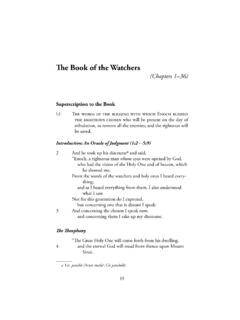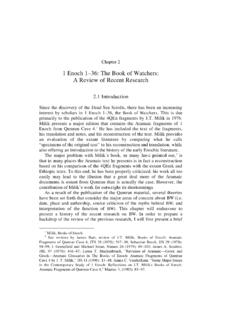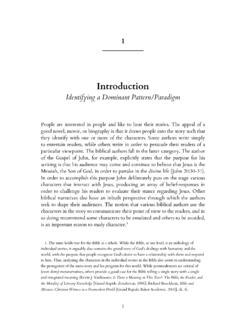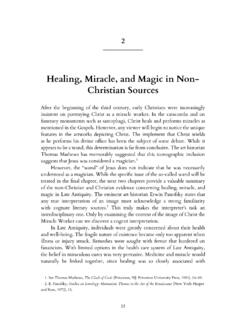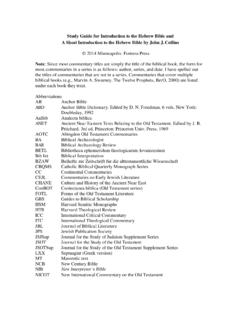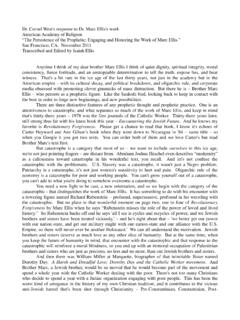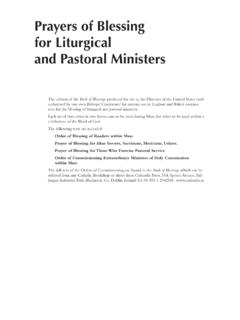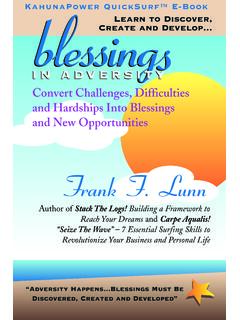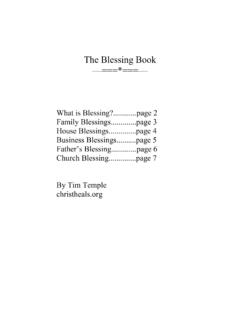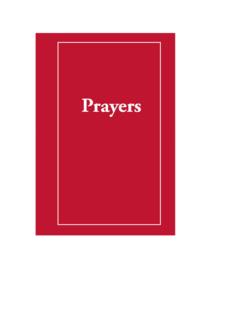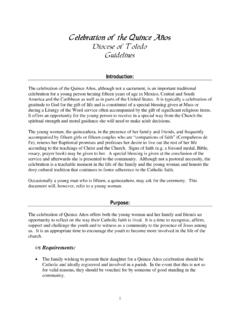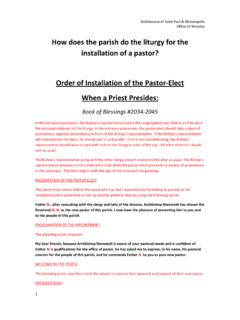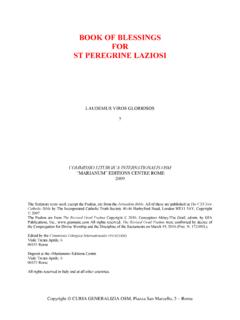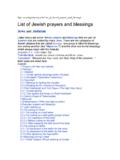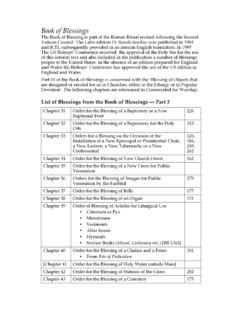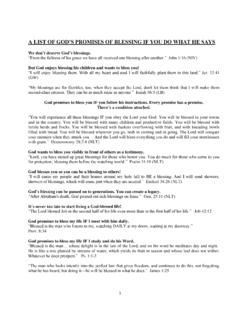Transcription of Study Guide - Augsburg Fortress
1 Study Guide 1 Original Blessing: Study Guide This is a six-week Study Guide , complete with suggested readings, discussion questions, pull quotes, and brief summary points, to be used in conjunction with the book , Original Blessing: Putting Sin in its Rightful Place. This Study Guide is intended for use in classrooms, church small groups, book clubs, and Sunday school classes. Each week includes reading assignments to be completed before the session. It s important to read ahead so you can be ready for discussions and questions. Think of this Guide as a six-week course, covering the most relevant themes of the book .
2 Each section also includes questions for discussion, key takeaways, and a few key quotes that can foster deeper conversation. Of course, if you want to extend the Study beyond six weeks, there are plenty of resources to allow for a fuller conversation on the chapters as needed. Week One: Awakening to Blessing Read: Introduction, Blessing is Like Bulletproof Glass, Blessing is God s Prerogative Scripture for reflection: Isaiah 43:1, Genesis 1 Questions for Contemplation and Discussion: If you had to describe your faith in a few sentences, what would your elevator pitch be? Did you grow up in a tradition that described the gospel as a problem of separation from God and Jesus as a solution?
3 How do you resonate with that description? Can you see reasons why a story of separation might be problematic, and even wrong? Much of our religious language describes God as being high above us, which can give us a false sense that God is not also near to us. What shifts when we imagine ourselves in God? Notice the range of ways you use the word good in your own life. We remember in Mark 10:18 when Jesus said, Why do you call me good? No one is good except God alone. What does it mean in scripture for someone or something to be good? Shroyer describes goodness as both an origin and a goal, a theme that will continue throughout the book .
4 Discuss the distinctions between these two, and how they relate to original blessing. 2 What does it mean that blessing is part of the natural order of things, rather than something magical or supernatural? We are used to hearing God s sovereignty described in terms of God s power. What does it mean to see original blessing as a declaration of God s sovereignty in faithful relationship instead? How is original blessing different than an everyone-gets-a-trophy idea? Shroyer talks about three basic reactions to blessing- relief, anger, and fear. Which of these resonates with you and why?
5 Is there another reaction you had? Key Takeaways: 1. While the story of original sin is founded on separation from God, original blessing is founded on connection with God (and, by extension, with others and all of creation). 2. Original blessing is the idea that God has chosen to be in a relationship with us, and God has chosen to stay faithful to that relationship no matter what. 3. Though we can choose how or whether to respond to God, God has chosen to echo blessing over us. Original blessing is the gift we are naturally given as humans made in God s image. 4. The word barak in Hebrew makes what Shroyer calls a circle of blessing, with God blessing us, us blessing each other, and us blessing God.
6 This is how original blessing works, too. We ground ourselves in God s blessing, and we are able to love God and others. Key Quotes: Sin is not at the heart of our nature; blessing is. (xi) Our human nature is designed to belong, and, specifically, to belong to God. (4) We are in a relationship with God, and God started it. And God is sticking with it. (6) Rather than seeing our lives as naturally and deeply connected with God, original sin has convinced us that human nature stands not only at a distance from God but also in some inborn, natural way as contrary to God. (8) Our relationship with God is not in the glass.
7 It IS the glass. (9) Original blessing isn t just a state of being, but also a process of becoming. We could say blessing is, and blessing unfolds. (11-12) The cost of blessing is to see the world the way God sees the world. (23) 3 Week Two: Discussing Original Sin Read: Original Sin is Unnecessary and Unhelpful, A Tale of Two Boxes and a Golden Thread Scripture for reflection: Deuteronomy 30, John 10:7-18 Questions for Contemplation and Discussion: What is your response to the realization that Jesus, the disciples, and Paul did not have a concept of the doctrine of original sin in mind?
8 If Adam and Eve didn t have a sin nature and they still sinned, why can t we say the same about us? Is there anything we gain by a belief in original sin? Shroyer lists 4 problems with the doctrine of original sin: waging unnecessary war with God, the danger of a sin nature, protecting personhood, and a theological extreme makeover. Discuss each of these. Which resonated with you most? Where would you disagree? What would you add? Shroyer describes the pivotal shift between the boxes of death and sin in the East and West churches. What s at stake in shifting the boxes? Which would you use?
9 Have there been times in your life when you have lost the golden thread of blessing? Did you find your way back, and if so, how? Key Takeaways: 1. It s difficult for us to imagine that original sin hasn t always been universally accepted. But the early church, the Eastern church, and our Jewish and Muslim siblings tell a different story. 2. Some people hold onto the idea of original sin because they think the only other option is to believe people are perfect (or people can possibly be perfect). But that s not true, and those aren t the only two options. 3. When we decide to focus on sin instead of death as the biggest reality, it shifts the way we see a whole lot of other things.
10 4. Original blessing is like a golden thread we can find anytime we get lost and want to come back home. Key Quotes: Original sin is the red sock in our theological laundry. It has the potential to discolor everything, and it often does. (26) 4 All have sinned and fall short of God s glory. We can leave it at that. (28) One of the most disturbing things about original sin is that it ensnares us in an endless cycle of battle. It is a tour of shame (not duty) that runs on constant redeployment. (35) Seeing people as inherently flawed is a terribly convenient way to devalue each other, even if that i sn t what the doctrine intended.
